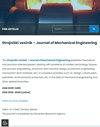钢丝绳输送带的自动拼接方法。作为制备工艺的水喷射的评价
IF 1.2
4区 工程技术
Q3 ENGINEERING, MECHANICAL
Strojniski Vestnik-Journal of Mechanical Engineering
Pub Date : 2017-10-10
DOI:10.5545/SV-JME.2017.4363
引用次数: 6
摘要
随着对矿产资源需求的不断增加,输送系统的长度也在不断增加。轴线之间的长度可达15公里以上。由于便于管理的尺寸和重量,合适的传送带可分成长达300米的区段生产。最后的组装发生在输送系统,其中众多的部分被连接到一个长传送带。装配准备中的一个重要环节是剥离钢丝绳,这主要是使用基本技术手工进行的。由于采用自动化和面向应用的制备方法可以最大限度地减少输送机停机时间并提高接头质量,因此优化潜力很高。在这项研究中,研究了纯水射流的应用,因为这种选择性剥离方法为自动化和粗糙表面的产生提供了很大的潜力。目的是确定是否有可能在不损坏钢丝锌涂层的情况下有效、均匀和选择性地去除橡胶。在参数研究之后,对生成的切口几何形状和表面进行了研究。通过显微照片的制备,对剥离后的钢丝和锌镀层进行了分析。最后,对水射流作为一种自动化的接头和修复准备方法的适用性进行了评价。本文章由计算机程序翻译,如有差异,请以英文原文为准。
Automatable Splicing Method for Steel Cord Conveyor Belts – Evaluation of Water Jetting as a Preparation Process
The increased demand of mineral resources leads to worldwide application of incessantly longer conveying systems. The length between axes can amount to 15 km and more. Owing to manageable dimensions and weight, appropriate conveyor belts are produced in segments of up to 300 m. Final assembly takes place at the conveyor system, where the multitude of segments is connected to a long conveyor belt. An important point in assembly preparation is the stripping of the steel cords, which is mainly carried out manually using rudimentary techniques. The optimization potential is high, since the adoption of automatable and application-oriented preparation methods can minimize the conveyor downtime and improve the joint quality.
In this study, the application of the pure water jet is investigated, since this selective stripping method offers a lot of potential for automation and the creation of rough surfaces. The objective was to determine if an efficient, homogenous and selective removal of the rubber is possible without damaging the zinc coating of the steel cords. Following a parameter study, the generated kerf geometries and surfaces were investigated. The stripped steel cords and zinc coatings were analyzed through the preparation of micrographs. Concluding, an evaluation about the qualification of water jetting as an automatable method for joint and repair preparation is made.
求助全文
通过发布文献求助,成功后即可免费获取论文全文。
去求助
来源期刊
CiteScore
3.00
自引率
17.60%
发文量
56
审稿时长
4.1 months
期刊介绍:
The international journal publishes original and (mini)review articles covering the concepts of materials science, mechanics, kinematics, thermodynamics, energy and environment, mechatronics and robotics, fluid mechanics, tribology, cybernetics, industrial engineering and structural analysis.
The journal follows new trends and progress proven practice in the mechanical engineering and also in the closely related sciences as are electrical, civil and process engineering, medicine, microbiology, ecology, agriculture, transport systems, aviation, and others, thus creating a unique forum for interdisciplinary or multidisciplinary dialogue.

 求助内容:
求助内容: 应助结果提醒方式:
应助结果提醒方式:


